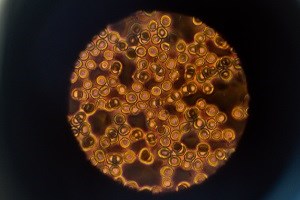Cryopreservation of whole blood for EBV transformation and preparation and storage of peripheral blood lymphocytes (PBLs)
 The cryopreservation of separated peripheral blood lymphocytes (PBLs) or whole blood enables investigators to add value to their collection by retaining the option for future generation of cell lines, which represent a renewable source of DNA and other cellular materials. As part of routine Quality Assurance, blood spot cards for verification of cell line and DNA authenticity are prepared from every sample at time of receipt. All samples are frozen using a rate-controlled freezer, and are stored in vapour phase liquid nitrogen in ECACC's purpose built ultra-low temperature storage facility.
The cryopreservation of separated peripheral blood lymphocytes (PBLs) or whole blood enables investigators to add value to their collection by retaining the option for future generation of cell lines, which represent a renewable source of DNA and other cellular materials. As part of routine Quality Assurance, blood spot cards for verification of cell line and DNA authenticity are prepared from every sample at time of receipt. All samples are frozen using a rate-controlled freezer, and are stored in vapour phase liquid nitrogen in ECACC's purpose built ultra-low temperature storage facility.
Processing capacity is in excess of 1500 blood samples per month, and samples are processed six days per week.
Preparation and storage of PBLs
PBLs are separated from blood samples using density gradient centrifugation. Cryopreservation of PBLs does not affect their subsequent EBV transformation. EBV transformation from separated lymphocytes remains the "gold standard" method, and is recommended where cell lines from an entire cohort are required.
Cryopreservation of whole blood
This represents an alternative to storage of PBLs for customers who may not require cell lines from their entire cohort initially, but who wish to retain the option to generate cell lines form a sub-cohort at some future date.
ECACC is licensed under the Human Tissue Act 2004 for the storage of primary human material for research purposes.
